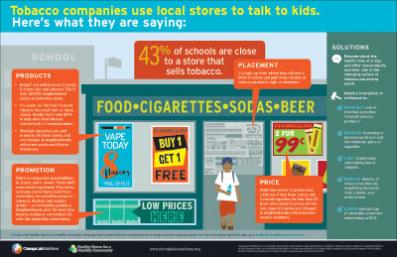Tobacco Companies Are Sweet-Talking Our Kids
Talking points & strategies
Many communities have convenience stores close to schools, and kids frequent them before, during, and after school. Most people don’t realize that tobacco companies use convenience stores to advertise fruit- and candy-flavored tobacco products at prices that kids can afford.
Placing tobacco products at prime locations in these stores ensures that every customer sees them, even kids. In California, approximately 37,000 stores sell tobacco. In low-income areas and areas with a majority of African American or Hispanic residents, there are many more stores that sell tobacco, and they are closer together than in other areas. Not surprisingly, low-income and African American communities suffer most from the negative health effects associated with tobacco use.
Reducing the number of stores that sell tobacco and limiting how close they can be to schools and other places kids frequent are good ways to decrease tobacco use, curb exposure to tobacco marketing, and promote health equity. Prohibiting the sale of flavored tobacco products, including menthol cigarettes, flavored cigars, hookah and e-cigarettes can help prevent kids from establishing a deadly lifelong addiction. Limiting price discounts and reducing in-store advertising also makes tobacco products less attractive to kids.
ChangeLab Solutions, in collaboration with the Healthy Stores for a Healthy Community campaign, created this easy-to-use infographic to illustrate ways communities can make it much more difficult for Big Tobacco to sweet-talk our kids. Residents, advocates, and decisionmakers can use this resource to (1) learn why limiting tobacco retailers’ proximity to schools, reducing their product offerings, setting minimum package sizes and prices, and restricting their promotional strategies are important for children’s health, and (2) help stakeholders choose the best strategies for their community.
ChangeLab Solutions is available to provide technical assistance to local governments in California that are pursuing retail-based tobacco control strategies. Contact us to learn more.





